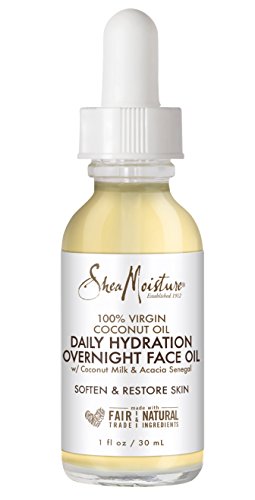
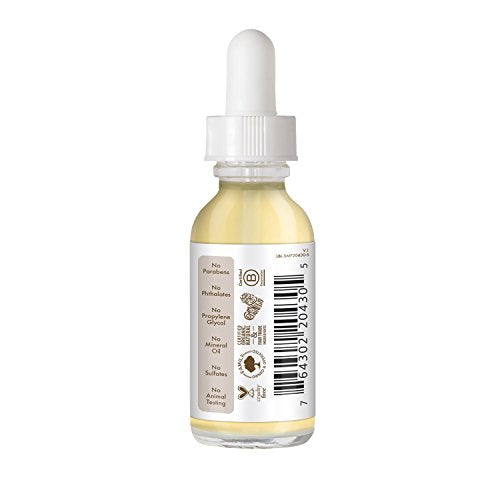
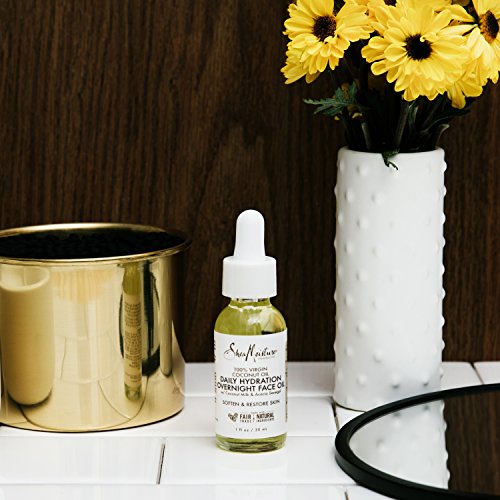
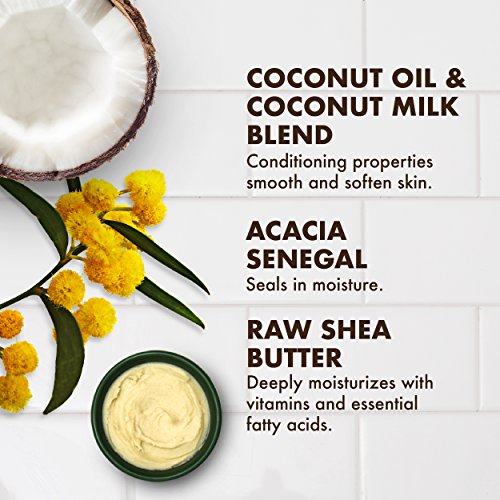
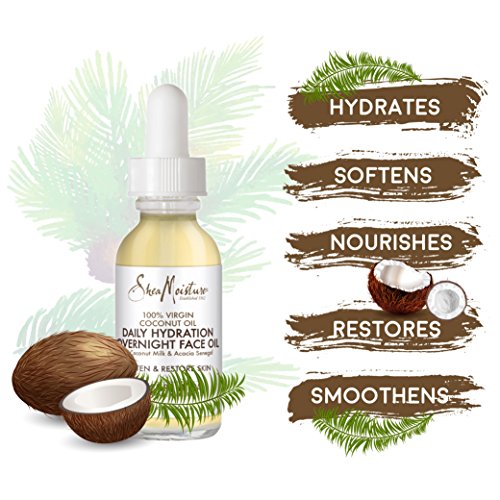
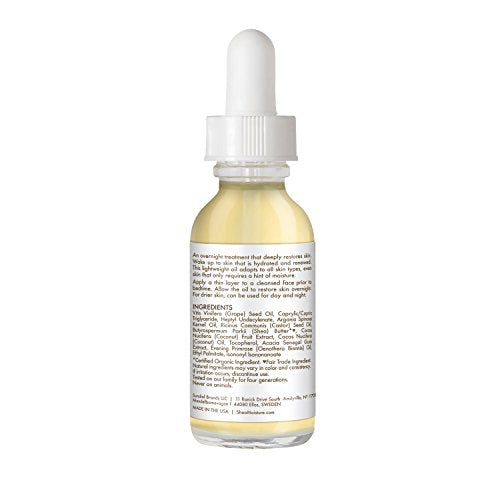
SheaMoisture Overnight Face Oil - Daily Hydration, Fair Trade Ingredients - 1 oz


Ricinus Communis (Castor) Seed Oil
Medium RiskCastor oil is extracted from the seeds of Ricinus communis and is commonly used in cosmetic and personal care products for its moisturizing and emollient properties. It is known for its ability to enhance skin absorption and provide a protective barrier.
Sustai Insights
Castor oil offers functional benefits as a moisturizer and emollient, enhancing skin absorption and providing a barrier against moisture loss. It is sustainably sourced and biodegradable. However, potential health risks include low levels of irritation and moderate concerns regarding developmental and reproductive toxicity. Environmental risks are low, with no significant pollutant or bioaccumulation concerns reported. Regulatory status shows no current restrictions. Overall, the risk level is assessed as medium, with recommendations for safe usage practices, and potential alternatives include other plant-based oils.
Vitis Vinifera (Grape) Seed Oil
Low RiskVitis vinifera (grape) seed oil is derived from the seeds of grapes, primarily used in cosmetics for its emollient properties. It acts as a moisturizer and is often included in formulations for skin care products due to its fatty acid composition and antioxidant potential.
Sustai Insights
Grape seed oil provides functional benefits as an effective moisturizer and antioxidant, contributing to skin hydration and protection. It is sustainably sourced and biodegradable. Health risks are low, with minimal concerns regarding carcinogenicity, allergies, or reproductive toxicity. Environmental impact is also low, with no significant pollutant potential. Regulatory bodies do not impose restrictions on its use. Overall, the ingredient poses a low risk, making it a safe choice in cosmetic formulations.
Isononyl Isononanoate
Low RiskIsononyl isononanoate is a synthetic skin conditioning agent commonly used in cosmetic formulations to enhance skin feel and texture. It is primarily utilized for its emollient properties, helping to soften and smooth the skin without leaving a greasy residue.
Sustai Insights
Isononyl isononanoate provides effective skin conditioning benefits, enhancing the texture of products. It is considered low risk for health concerns such as carcinogenicity, allergies, and reproductive toxicity. Environmental impact assessments indicate minimal pollution and bioaccumulation potential. Regulatory agencies do not impose significant restrictions on its use, maintaining a low overall risk profile. Safe usage practices are recommended, but alternatives exist for those seeking different formulations. In conclusion, isononyl isononanoate is associated with low risk in both health and environmental contexts.
Acacia Senegal Gum Extract
Low RiskAcacia senegal gum extract is an extract derived from the gum of the Acacia senegal tree, commonly used in cosmetics for its thickening and emulsifying properties. It serves to stabilize formulations and improve texture without imparting strong scents or colors.
Sustai Insights
Acacia senegal gum extract offers functional benefits as an effective emulsifier and stabilizer in cosmetic formulations, supporting product texture and stability. It is considered low risk for health concerns such as carcinogenicity, allergies, and developmental toxicity, with no significant environmental hazards reported. Regulatory status indicates no widespread restrictions. Overall, it presents a low risk profile, making it a favorable choice in cosmetic applications.
Oenothera Biennis (Evening Primrose) Oil
Low RiskEvening primrose oil is extracted from Oenothera biennis seeds and is commonly used in cosmetic formulations for its moisturizing properties. It contains gamma-linolenic acid (GLA), which is believed to support skin health and improve hydration.
Sustai Insights
Evening primrose oil offers functional benefits as a moisturizer and skin soother, derived from sustainably sourced seeds, contributing to its appeal. Health risks are low, with negligible concerns regarding carcinogenicity, allergies, and reproductive toxicity. Environmental assessments indicate no significant pollutants or bioaccumulation potential. Regulatory bodies do not impose restrictions on its use. Overall, the risk level is low, making it a suitable choice for cosmetic applications. Safe usage practices should be followed, although alternatives like borage oil may provide similar benefits.
Argania Spinosa (Argan) Kernel Oil
Low RiskArgania spinosa (argan) kernel oil is a fixed oil extracted from the kernels of the argan tree, native to Morocco. It is commonly used in cosmetic formulations for its moisturizing properties, serving as an emollient and skin conditioner.
Sustai Insights
Argania spinosa kernel oil offers functional benefits such as effective hydration and nourishment for the skin and hair. It is sustainably sourced and biodegradable, contributing positively to environmental considerations. Health risks are low, with minimal concerns regarding carcinogenicity, allergies, or reproductive toxicity. There are no current regulatory restrictions on its use. Overall, it poses low risk, making it a suitable ingredient in cosmetic products. Safe usage practices should be maintained, and alternatives like jojoba oil may also be considered for similar benefits.
10 Undecenoic Acid, Heptyl Ester
Low Risk10 Undecenoic Acid, Heptyl Ester is an ester derived from undecenoic acid and heptanol. It is primarily used in cosmetic formulations due to its emollient properties, contributing to product texture and skin feel.
Sustai Insights
This ingredient offers functional benefits as an emollient, enhancing product application and texture. It has low health risks, with no significant concerns for carcinogenicity, allergies, or reproductive toxicity. Environmental risks are minimal, with no evidence of pollutant potential or bioaccumulation. Regulatory bodies have not placed significant restrictions on its use. Overall, it is assessed as low risk, with safe usage practices recommended. Alternatives may include other plant-based esters or synthetic emollients that provide similar benefits.
Ethyl Palmitate
Low RiskEthyl palmitate is an ester of ethyl alcohol and palmitic acid. It is commonly used in cosmetic and personal care products as an emollient, which helps to smooth and soften the skin, and as a solvent for other ingredients.
Sustai Insights
Ethyl palmitate offers functional benefits such as acting as an effective emollient and solvent, enhancing product texture. It is considered to have low health risks, with no significant concerns related to carcinogenicity, allergies, or reproductive toxicity. Environmentally, it poses low risks, with no notable pollutant or bioaccumulation potential. Regulatory assessments indicate no specific restrictions. Safe usage practices are advised to ensure minimal exposure. Alternatives include other plant-based esters that may provide similar benefits. Overall, the ingredient is assessed as low risk.
Cocos Nucifera Fruit Extract
Low RiskCocos Nucifera Fruit Extract is an extract derived from the fruit of the coconut palm, commonly used in cosmetic formulations for its moisturizing properties. It serves primarily as a skin conditioning agent, contributing to product texture and hydration.
Sustai Insights
Cocos Nucifera Fruit Extract offers functional benefits such as effective skin hydration and conditioning, with sustainable sourcing potential. Scientific assessments indicate low health risks, including minimal concerns for carcinogenicity, allergies, and reproductive toxicity. Environmental impacts are also low, with no significant bioaccumulation or pollution concerns. Regulatory bodies do not impose restrictions on its use, leading to an overall low-risk classification. Safe usage practices include patch testing for sensitive individuals. Alternatives like shea butter or other plant-based extracts may be considered for similar benefits.
Tocopherol
Low RiskTocopherols are a class of naturally occurring compounds, primarily known for their role as antioxidants. They are commonly used in cosmetic and skincare products to help stabilize formulations and protect ingredients from oxidative damage.
Sustai Insights
Tocopherols provide functional benefits such as antioxidant protection and skin conditioning. They are generally recognized as safe, with low concerns regarding carcinogenicity, allergies, and reproductive toxicity. However, enhanced skin absorption and potential endocrine disruption are noted. Regulatory bodies have not imposed significant restrictions on tocopherols, categorizing the overall risk as low. Safe usage practices should be observed, and while alternatives exist, tocopherols remain a viable option in formulations.
Caprylic/Capric Triglyceride
Low RiskCaprylic/capric triglyceride is a mixed triester derived from coconut oil and glycerin, primarily used as an emollient and skin-conditioning agent in cosmetic formulations. It serves to improve the texture and spreadability of products while providing a lightweight, non-greasy feel on the skin.
Sustai Insights
Caprylic/capric triglyceride offers functional benefits as an effective emollient, enhancing skin hydration without clogging pores. It is biodegradable, contributing to sustainability. Health risks are low, with minimal concerns regarding carcinogenicity, allergies, or reproductive toxicity. Environmental impacts are also low, with no known pollutant status. Regulatory assessments indicate no current restrictions. Overall, this ingredient presents a low risk profile, making it a safe choice in cosmetic applications.
Cocos Nucifera (Coconut) Oil
Low RiskCocos Nucifera (Coconut) Oil is derived from the kernels of the coconut palm. It is primarily used in cosmetic formulations for its emollient and moisturizing properties, making it suitable for skin and hair care products.
Sustai Insights
Coconut oil serves as an effective moisturizer and emollient, promoting skin hydration and softness. It is sustainably sourced and biodegradable. Health risks are minimal, with low concerns regarding carcinogenicity, allergens, and reproductive toxicity. Environmental impact is also low, as it does not contribute significantly to pollution or bioaccumulation. Regulatory bodies have not issued restrictions on its use. Overall, coconut oil presents a low risk for health and environmental concerns, making it a safe ingredient in cosmetic products.
Butyrospermum Parkii (Shea) Butter
Low RiskButyrospermum parkii (shea) butter is a vegetable fat derived from the nuts of the shea tree. It is commonly used in cosmetic formulations for its emollient properties, providing moisture and improving skin texture. Additionally, shea butter is known for its ability to enhance the stability of products and deliver a creamy texture.
Sustai Insights
Shea butter offers functional benefits as an effective moisturizer, enhancing skin barrier function and texture. It is sustainably sourced and biodegradable, contributing to eco-friendliness. Health-wise, it is associated with low risks for carcinogenicity, allergies, and reproductive toxicity. Environmental impacts are minimal, with no significant pollutant potential identified. Regulatory assessments indicate no current restrictions. Overall, the ingredient presents a low risk, making it a favorable choice in cosmetic formulations.
Vitis Vinifera (Grape) Seed Oil
Low RiskVitis vinifera (grape) seed oil is derived from the seeds of grapes, primarily used in cosmetics for its emollient properties. It acts as a moisturizer and is often included in formulations for skin care products due to its fatty acid composition and antioxidant potential.
Sustai Insights
Grape seed oil provides functional benefits as an effective moisturizer and antioxidant, contributing to skin hydration and protection. It is sustainably sourced and biodegradable. Health risks are low, with minimal concerns regarding carcinogenicity, allergies, or reproductive toxicity. Environmental impact is also low, with no significant pollutant potential. Regulatory bodies do not impose restrictions on its use. Overall, the ingredient poses a low risk, making it a safe choice in cosmetic formulations.
Isononyl Isononanoate
Low RiskIsononyl isononanoate is a synthetic skin conditioning agent commonly used in cosmetic formulations to enhance skin feel and texture. It is primarily utilized for its emollient properties, helping to soften and smooth the skin without leaving a greasy residue.
Sustai Insights
Isononyl isononanoate provides effective skin conditioning benefits, enhancing the texture of products. It is considered low risk for health concerns such as carcinogenicity, allergies, and reproductive toxicity. Environmental impact assessments indicate minimal pollution and bioaccumulation potential. Regulatory agencies do not impose significant restrictions on its use, maintaining a low overall risk profile. Safe usage practices are recommended, but alternatives exist for those seeking different formulations. In conclusion, isononyl isononanoate is associated with low risk in both health and environmental contexts.
Acacia Senegal Gum Extract
Low RiskAcacia senegal gum extract is an extract derived from the gum of the Acacia senegal tree, commonly used in cosmetics for its thickening and emulsifying properties. It serves to stabilize formulations and improve texture without imparting strong scents or colors.
Sustai Insights
Acacia senegal gum extract offers functional benefits as an effective emulsifier and stabilizer in cosmetic formulations, supporting product texture and stability. It is considered low risk for health concerns such as carcinogenicity, allergies, and developmental toxicity, with no significant environmental hazards reported. Regulatory status indicates no widespread restrictions. Overall, it presents a low risk profile, making it a favorable choice in cosmetic applications.
Oenothera Biennis (Evening Primrose) Oil
Low RiskEvening primrose oil is extracted from Oenothera biennis seeds and is commonly used in cosmetic formulations for its moisturizing properties. It contains gamma-linolenic acid (GLA), which is believed to support skin health and improve hydration.
Sustai Insights
Evening primrose oil offers functional benefits as a moisturizer and skin soother, derived from sustainably sourced seeds, contributing to its appeal. Health risks are low, with negligible concerns regarding carcinogenicity, allergies, and reproductive toxicity. Environmental assessments indicate no significant pollutants or bioaccumulation potential. Regulatory bodies do not impose restrictions on its use. Overall, the risk level is low, making it a suitable choice for cosmetic applications. Safe usage practices should be followed, although alternatives like borage oil may provide similar benefits.
Ricinus Communis (Castor) Seed Oil
Medium RiskCastor oil is extracted from the seeds of Ricinus communis and is commonly used in cosmetic and personal care products for its moisturizing and emollient properties. It is known for its ability to enhance skin absorption and provide a protective barrier.
Sustai Insights
Castor oil offers functional benefits as a moisturizer and emollient, enhancing skin absorption and providing a barrier against moisture loss. It is sustainably sourced and biodegradable. However, potential health risks include low levels of irritation and moderate concerns regarding developmental and reproductive toxicity. Environmental risks are low, with no significant pollutant or bioaccumulation concerns reported. Regulatory status shows no current restrictions. Overall, the risk level is assessed as medium, with recommendations for safe usage practices, and potential alternatives include other plant-based oils.
Argania Spinosa (Argan) Kernel Oil
Low RiskArgania spinosa (argan) kernel oil is a fixed oil extracted from the kernels of the argan tree, native to Morocco. It is commonly used in cosmetic formulations for its moisturizing properties, serving as an emollient and skin conditioner.
Sustai Insights
Argania spinosa kernel oil offers functional benefits such as effective hydration and nourishment for the skin and hair. It is sustainably sourced and biodegradable, contributing positively to environmental considerations. Health risks are low, with minimal concerns regarding carcinogenicity, allergies, or reproductive toxicity. There are no current regulatory restrictions on its use. Overall, it poses low risk, making it a suitable ingredient in cosmetic products. Safe usage practices should be maintained, and alternatives like jojoba oil may also be considered for similar benefits.
10 Undecenoic Acid, Heptyl Ester
Low Risk10 Undecenoic Acid, Heptyl Ester is an ester derived from undecenoic acid and heptanol. It is primarily used in cosmetic formulations due to its emollient properties, contributing to product texture and skin feel.
Sustai Insights
This ingredient offers functional benefits as an emollient, enhancing product application and texture. It has low health risks, with no significant concerns for carcinogenicity, allergies, or reproductive toxicity. Environmental risks are minimal, with no evidence of pollutant potential or bioaccumulation. Regulatory bodies have not placed significant restrictions on its use. Overall, it is assessed as low risk, with safe usage practices recommended. Alternatives may include other plant-based esters or synthetic emollients that provide similar benefits.
Ethyl Palmitate
Low RiskEthyl palmitate is an ester of ethyl alcohol and palmitic acid. It is commonly used in cosmetic and personal care products as an emollient, which helps to smooth and soften the skin, and as a solvent for other ingredients.
Sustai Insights
Ethyl palmitate offers functional benefits such as acting as an effective emollient and solvent, enhancing product texture. It is considered to have low health risks, with no significant concerns related to carcinogenicity, allergies, or reproductive toxicity. Environmentally, it poses low risks, with no notable pollutant or bioaccumulation potential. Regulatory assessments indicate no specific restrictions. Safe usage practices are advised to ensure minimal exposure. Alternatives include other plant-based esters that may provide similar benefits. Overall, the ingredient is assessed as low risk.
Cocos Nucifera Fruit Extract
Low RiskCocos Nucifera Fruit Extract is an extract derived from the fruit of the coconut palm, commonly used in cosmetic formulations for its moisturizing properties. It serves primarily as a skin conditioning agent, contributing to product texture and hydration.
Sustai Insights
Cocos Nucifera Fruit Extract offers functional benefits such as effective skin hydration and conditioning, with sustainable sourcing potential. Scientific assessments indicate low health risks, including minimal concerns for carcinogenicity, allergies, and reproductive toxicity. Environmental impacts are also low, with no significant bioaccumulation or pollution concerns. Regulatory bodies do not impose restrictions on its use, leading to an overall low-risk classification. Safe usage practices include patch testing for sensitive individuals. Alternatives like shea butter or other plant-based extracts may be considered for similar benefits.
Tocopherol
Low RiskTocopherols are a class of naturally occurring compounds, primarily known for their role as antioxidants. They are commonly used in cosmetic and skincare products to help stabilize formulations and protect ingredients from oxidative damage.
Sustai Insights
Tocopherols provide functional benefits such as antioxidant protection and skin conditioning. They are generally recognized as safe, with low concerns regarding carcinogenicity, allergies, and reproductive toxicity. However, enhanced skin absorption and potential endocrine disruption are noted. Regulatory bodies have not imposed significant restrictions on tocopherols, categorizing the overall risk as low. Safe usage practices should be observed, and while alternatives exist, tocopherols remain a viable option in formulations.
Caprylic/Capric Triglyceride
Low RiskCaprylic/capric triglyceride is a mixed triester derived from coconut oil and glycerin, primarily used as an emollient and skin-conditioning agent in cosmetic formulations. It serves to improve the texture and spreadability of products while providing a lightweight, non-greasy feel on the skin.
Sustai Insights
Caprylic/capric triglyceride offers functional benefits as an effective emollient, enhancing skin hydration without clogging pores. It is biodegradable, contributing to sustainability. Health risks are low, with minimal concerns regarding carcinogenicity, allergies, or reproductive toxicity. Environmental impacts are also low, with no known pollutant status. Regulatory assessments indicate no current restrictions. Overall, this ingredient presents a low risk profile, making it a safe choice in cosmetic applications.
Cocos Nucifera (Coconut) Oil
Low RiskCocos Nucifera (Coconut) Oil is derived from the kernels of the coconut palm. It is primarily used in cosmetic formulations for its emollient and moisturizing properties, making it suitable for skin and hair care products.
Sustai Insights
Coconut oil serves as an effective moisturizer and emollient, promoting skin hydration and softness. It is sustainably sourced and biodegradable. Health risks are minimal, with low concerns regarding carcinogenicity, allergens, and reproductive toxicity. Environmental impact is also low, as it does not contribute significantly to pollution or bioaccumulation. Regulatory bodies have not issued restrictions on its use. Overall, coconut oil presents a low risk for health and environmental concerns, making it a safe ingredient in cosmetic products.
Butyrospermum Parkii (Shea) Butter
Low RiskButyrospermum parkii (shea) butter is a vegetable fat derived from the nuts of the shea tree. It is commonly used in cosmetic formulations for its emollient properties, providing moisture and improving skin texture. Additionally, shea butter is known for its ability to enhance the stability of products and deliver a creamy texture.
Sustai Insights
Shea butter offers functional benefits as an effective moisturizer, enhancing skin barrier function and texture. It is sustainably sourced and biodegradable, contributing to eco-friendliness. Health-wise, it is associated with low risks for carcinogenicity, allergies, and reproductive toxicity. Environmental impacts are minimal, with no significant pollutant potential identified. Regulatory assessments indicate no current restrictions. Overall, the ingredient presents a low risk, making it a favorable choice in cosmetic formulations.
Experience the nourishing power of SheaMoisture's Overnight Face Oil, crafted with 100% Virgin Coconut Oil for all skin types. This luxurious oil deeply hydrates, rejuvenates, and revitalizes your skin overnight, ensuring you wake up with a radiant glow.
- Deep Hydration: Infused with Fair Trade Shea Butter, this face oil delivers essential fatty acids and vitamins for optimal moisture retention.
- Skin Smoothening: The Coconut Oil and Coconut Milk Blend work together to condition, soften, and enhance skin texture.
- Moisture Sealing: Acacia Senegal effectively seals in hydration, making it perfect for dry skin types.
- Clean Ingredients: Free from parabens, phthalates, mineral oil, and sulfates, ensuring a gentle, non-toxic skincare experience.
- Versatile Use: Ideal for overnight application, but can also be used during the day for an extra hydration boost, making it a staple in your skincare routine.
Embrace a healthy, hydrated complexion while supporting ethical practices with SheaMoisture's commitment to Fair Trade and organic ingredients.
Subscribe & Save with Sustai
- Best Price Guarantee: Always enjoy the lowest prices on sustainable home essentials.
- No Surprises: We’ll notify you before shipping. No hidden fees, ever.
- You’re in Charge: Change, pause, or cancel your subscription anytime with ease.
- Eco-Friendly Deliveries: Our grouped shipments mean less packaging and lower emissions.
Join us on a sustainable journey. Special offers for a limited time! Prices and promotions may change.
Recommended Products
Experience the nourishing power of SheaMoisture's Overnight Face Oil, crafted with 100% Virgin Coconut Oil for all skin types. This luxurious oil deeply hydrates, rejuvenates, and revitalizes your skin overnight, ensuring you wake up with a radiant glow.
- Deep Hydration: Infused with Fair Trade Shea Butter, this face oil delivers essential fatty acids and vitamins for optimal moisture retention.
- Skin Smoothening: The Coconut Oil and Coconut Milk Blend work together to condition, soften, and enhance skin texture.
- Moisture Sealing: Acacia Senegal effectively seals in hydration, making it perfect for dry skin types.
- Clean Ingredients: Free from parabens, phthalates, mineral oil, and sulfates, ensuring a gentle, non-toxic skincare experience.
- Versatile Use: Ideal for overnight application, but can also be used during the day for an extra hydration boost, making it a staple in your skincare routine.
Embrace a healthy, hydrated complexion while supporting ethical practices with SheaMoisture's commitment to Fair Trade and organic ingredients.

You can have at most 2 Sustainable Steals products in your cart
Customer Reviews
Customers’ View
Customers appreciate the moisturizing and nourishing properties of SheaMoisture's Overnight Face Oil, often noting that it leaves their skin feeling deeply hydrated and soft. Many highlight its effectiveness in restoring moisture, especially for dry skin, with one customer stating, "I wake up to a more radiant and hydrated complexion every day." The product is also praised for providing a healthy glow without clogging pores, enhancing the skin's appearance. However, some users express mixed feelings about the oiliness, describing it as either lightweight or too heavy, while others mention a less favorable scent resembling vegetable oil and issues with bottle leakage. Overall, this product is seen as a beneficial addition to skincare routines, particularly for those seeking clean beauty options free from harmful additives.
AI-generated from the text of customer reviewsThis product is rated 4.8 of 5.0 stars.
It has received 14 reviews.




